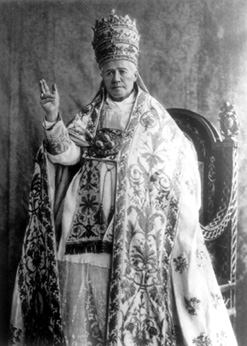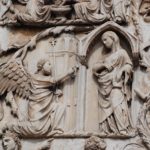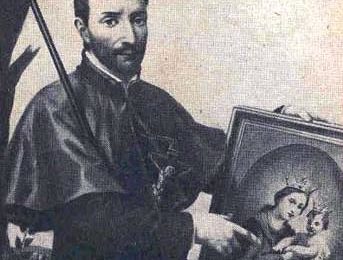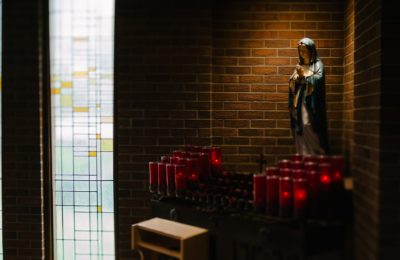May continues, and Catholics around the world scour their gardens for fresh buds to place on their May altars. Such tokens of love and gratitude towards Our Lady are willed by God, who was the first to honor Our Lady in her pure conception, choosing her among all women. We, the children of Mary, continue the tradition of honoring Mary, as God has done; and as our Catholic ancestors have done. Speaking of such ancestors: there was one of great virtue, and fame, who lived a hundred years ago, who never failed in his public office to give verbal and written tokens of love to the Blessed Virgin Mary; here I am speaking of the great saint, Pope Pius X. One example of such a public display of Marian devotion was his encyclical, Ad Diem Illum Laetissimum, which was published on February 2, 1904. The theme of this work was the promulgation and praise of the Immaculate Conception, the Blessed Virgin Mary.
Let us imagine that on this May morning, we fall upon an old dusty copy of said work in our long-deceased great-uncle’s attic, and read what that uncle might have read in his day by his reigning pontiff, Pope Pius X. The following excerpt from Ad Diem Illum Laetissimum is long, as I have difficulty eliminating portions of the text; because each written sentiment is a treasure house of Catholic tradition, doctrine, and truth. If we wish, as good children, to love Our Lady rightly, to possess and practice, as St. Louis de Montfort termed, true devotion to her; we must know her, and understand her, and her role in the life of Our Savior, and her role in our own lives. So without further ado, to the end I just mentioned, let us read Pope St. Pius X:
For can anyone fail to see that there is no surer or more direct road than by Mary for uniting all mankind in Christ and obtaining through Him the perfect adoption of sons, that we may be holy and immaculate in the sight of God? For if to Mary it was truly said: “Blessed art thou who hast believed because in thee shall be fulfilled the things that have been told thee by the Lord” (Luke i., 45); or in other words, that she would conceive and bring forth the Son of God and if she did receive in her breast Him who is by nature Truth itself in order that “He, generated in a new order and with a new nativity, though invisible in Himself, might become visible in our flesh” (St. Leo the Great, Ser. 2, De Nativ. Dom.): the Son of God made man, being the “author and consummator of our faith”; it surely follows that His Mother most holy should be recognized as participating in the divine mysteries and as being in a manner the guardian of them, and that upon her as upon a foundation, the noblest after Christ, rises the edifice of the faith of all centuries.
6. How think otherwise? Could not God have given us, in another way than through the Virgin the Redeemer of the human race and the Founder of the Faith? But, since Divine Providence has been pleased that we should have the Man-God through Mary, who conceived Him by the Holy Ghost and bore Him in her breast, it only remains for us to receive Christ from the hands of Mary. Hence whenever the Scriptures speak prophetically of the grace which was to appear among us, the Redeemer of mankind is almost invariably presented to us as united with His mother. The Lamb that is to rule the world will be sent – but He will be sent from the rock of the desert; the flower will blossom, but it will blossom from the root of Jesse. Adam, the father of mankind, looked to Mary crushing the serpent’s head, and he dried the tears that the malediction had brought into his eyes. Noë thought of her when shut up in the ark of safety, and Abraham when prevented from the slaying of his son; Jacob at the sight of the ladder on which angels ascended and descended; Moses amazed at the sight of the bush which burned but was not consumed; David escorting the arc of God with dancing and psalmody; Elias as he looked at the little cloud that rose out of the sea. In fine, after Christ, we find in Mary the end of the law and the fulfillment of the figures and oracles.
7. And that through the Virgin, and through her more than through any other means, we have offered us a way of reaching the knowledge of Jesus Christ, cannot be doubted when it is remembered that with her alone of all others Jesus was for thirty years united, as a son is usually united with a mother, in the closest ties of intimacy and domestic life. Who could better than His Mother have an open knowledge of the admirable mysteries of the birth and childhood of Christ, and above all of the mystery of the Incarnation, which is the beginning and the foundation of faith? Mary not only preserved and meditated on the events of Bethlehem and the facts which took place in Jerusalem in the Temple of the Lord, but sharing as she did the thoughts and the secret wishes of Christ she may be said to have lived the very life of her Son. Hence nobody ever knew Christ so profoundly as she did, and nobody can ever be more competent as a guide and teacher of the knowledge of Christ.
8. Hence it follows, as We have already pointed out, that the Virgin is more powerful than all others as a means for uniting mankind with Christ. Hence too since, according to Christ Himself, “Now this is eternal life: That they may know thee the only truly God, and Jesus Christ whom thou hast sent” (John xvii., 3), and since it is through Mary that we attain to the knowledge of Christ, through Mary also we most easily obtain that life of which Christ is the source and origin.
9. And if we set ourselves to consider how many and powerful are the causes by which this most holy Mother is filled with zeal to bestow on us these precious gifts, oh, how our hopes will be expanded!
10. For is not Mary the Mother of Christ? Then she is our Mother also. And we must in truth hold that Christ, the Word made Flesh, is also the Savior of mankind. He had a physical body like that of any other man: and again as Savior of the human family, he had a spiritual and mystical body, the society, namely, of those who believe in Christ. “We are many, but one sole body in Christ” (Rom. xii., 5). Now the Blessed Virgin did not conceive the Eternal Son of God merely in order that He might be made man taking His human nature from her, but also in order that by means of the nature assumed from her He might be the Redeemer of men. For which reason the Angel said to the Shepherds: “To-day there is born to you a Savior who is Christ the Lord” (Luke ii., 11). Wherefore in the same holy bosom of his most chaste Mother Christ took to Himself flesh, and united to Himself the spiritual body formed by those who were to believe in Him. Hence Mary, carrying the Savior within her, may be said to have also carried all those whose life was contained in the life of the Savior. Therefore all we who are united to Christ, and as the Apostle says are members of His body, of His flesh, and of His bones (Ephes. v., 30), have issued from the womb of Mary like a body united to its head. Hence, though in a spiritual and mystical fashion, we are all children of Mary, and she is Mother of us all. Mother, spiritually indeed, but truly Mother of the members of Christ, who are we (S. Aug. L. de S. Virginitate, c. 6).
11. If then the most Blessed Virgin is the Mother at once of God and men, who can doubt that she will work with all diligence to procure that Christ, Head of the Body of the Church (Coloss. i., 18), may transfuse His gifts into us, His members, and above all that of knowing Him and living through Him (I John iv., 9)?
12. Moreover it was not only the prerogative of the Most Holy Mother to have furnished the material of His flesh to the Only Son of God, Who was to be born with human members (S. Bede Ven. L. Iv. in Luc. xl.), of which material should be prepared the Victim for the salvation of men; but hers was also the office of tending and nourishing that Victim, and at the appointed time presenting Him for the sacrifice. Hence that uninterrupted community of life and labors of the Son and the Mother, so that of both might have been uttered the words of the Psalmist”My life is consumed in sorrow and my years in groans” (Ps xxx., 11). When the supreme hour of the Son came, beside the Cross of Jesus there stood Mary His Mother, not merely occupied in contemplating the cruel spectacle, but rejoicing that her Only Son was offered for the salvation of mankind, and so entirely participating in His Passion, that if it had been possible she would have gladly borne all the torments that her Son bore (S. Bonav. 1. Sent d. 48, ad Litt. dub. 4). And from this community of will and suffering between Christ and Mary she merited to become most worthily the Reparatrix of the lost world (Eadmeri Mon. De Excellentia Virg. Mariae, c. 9) and Dispensatrix of all the gifts that Our Savior purchased for us by His Death and by His Blood.
13. It cannot, of course, be denied that the dispensation of these treasures is the particular and peculiar right of Jesus Christ, for they are the exclusive fruit of His Death, who by His nature is the mediator between God and man. Nevertheless, by this companionship in sorrow and suffering already mentioned between the Mother and the Son, it has been allowed to the august Virgin to be the most powerful mediatrix and advocate of the whole world with her Divine Son (Pius IX. Ineffabilis). The source, then, is Jesus Christ “of whose fullness we have all received” (John i., 16), “from whom the whole body, being compacted and fitly joined together by what every joint supplieth, according to the operation in the measure of every part, maketh increase of the body unto the edifying of itself in charity” (Ephesians iv., 16). But Mary, as St. Bernard justly remarks, is the channel (Serm. de temp on the Nativ. B. V. De Aquaeductu n. 4); or, if you will, the connecting portion the function of which is to join the body to the head and to transmit to the body the influences and volitions of the head – We mean the neck. Yes, says St. Bernardine of Sienna, “she is the neck of Our Head, by which He communicates to His mystical body all spiritual gifts” (Quadrag. de Evangel. aetern. Serm. x., a. 3, c. iii.).
14. We are then, it will be seen, very far from attributing to the Mother of God a productive power of grace – a power which belongs to God alone. Yet, since Mary carries it over all in holiness and union with Jesus Christ, and has been associated by Jesus Christ in the work of redemption, she merits for us de congruo, in the language of theologians, what Jesus Christ merits for us de condigno, and she is the supreme Minister of the distribution of graces. Jesus “sitteth on the right hand of the majesty on high” (Hebrews i. b.). Mary sitteth at the right hand of her Son – a refuge so secure and a help so trusty against all dangers that we have nothing to fear or to despair of under her guidance, her patronage, her protection. (Pius IX. in Bull Ineffabilis).
15. These principles laid down, and to return to our design, who will not see that we have with good reason claimed for Mary that – as the constant companion of Jesus from the house at Nazareth to the height of Calvary, as beyond all others initiated to the secrets of his Heart, and as the distributor, by right of her Motherhood, of the treasures of His merits, – she is, for all these reasons, a most sure and efficacious assistance to us for arriving at the knowledge and love of Jesus Christ. Those, alas! furnish us by their conduct with a peremptory proof of it, who seduced by the wiles of the demon or deceived by false doctrines think they can do without the help of the Virgin. Hapless are they who neglect Mary under pretext of the honor to be paid to Jesus Christ! As if the Child could be found elsewhere than with the Mother!
16. Under these circumstances, Venerable Brethren, it is this end which all the solemnities that are everywhere being prepared in honor of the holy and Immaculate Conception of Mary should have in view. No homage is more agreeable to her, none is sweeter to her than that we should know and really love Jesus Christ. Let then crowds fill the churches – let solemn feasts be celebrated and public rejoicings be made: these are things eminently suited for enlivening our faith. But unless heart and will be added, they will all be empty forms, mere appearances of piety. At such a spectacle, the Virgin, borrowing the words of Jesus Christ, would address us with the just reproach: “This people honoureth me with their lips, but their heart is far from me” (Matth. xv., 8).
17. For to be right and good, worship of the Mother of God ought to spring from the heart; acts of the body have here neither utility nor value if the acts of the soul have no part in them. Now these latter can only have one object, which is that we should fully carry out what the divine Son of Mary commands. For if true love alone has the power to unite the wills of men, it is of the first necessity that we should have one will with Mary to serve Jesus our Lord. What this most prudent Virgin said to the servants at the marriage feast of Cana she addresses also to us: “Whatsoever he shall say to you, do ye” (John ii., 5). Now here is the word of Jesus Christ: “If you would enter into life, keep the commandments” (Matt. xix., 17). Let them each one fully convince himself of this, that if his piety towards the Blessed Virgin does not hinder him from sinning, or does not move his will to amend an evil life, it is a piety deceptive and Iying, wanting as it is in proper effect and its natural fruit.
18. If anyone desires a confirmation of this it may easily be found in the dogma of the Immaculate Conception of Mary. For leaving aside tradition which, as well as Scripture, is a source of truth, how has this persuasion of the Immaculate Conception of the Virgin appeared so conformed to the Catholic mind and feeling that it has been held as being one, and as it were inborn in the soul of the faithful? “We shrink from saying,” is the answer of Dionysius of Chartreux, “of this woman who was to crush the head of the serpent that had been crushed by him and that Mother of God that she had ever been a daughter of the Evil One” (Sent. d. 3, q. 1). No, to the Christian intelligence the idea is unthinkable that the flesh of Christ, holy, stainless, innocent, was formed in the womb of Mary of a flesh which had ever, if only for the briefest moment, contracted any stain. And why so, but because an infinite opposition separates God from sin? There certainly we have the origin of the conviction common to all Christians that Jesus Christ before, clothed in human nature, He cleansed us from our sins in His blood, accorded Mary the grace and special privilege of being preserved and exempted, from the first moment of her conception, from all stain of original sin.
19. If then God has such a horror of sin as to have willed to keep free the future Mother of His Son not only from stains which are voluntarily contracted but, by a special favor and in prevision of the merits of Jesus Christ, from that other stain of which the sad sign is transmitted to all us sons of Adam by a sort of hapless heritage: who can doubt that it is a duty for everyone who seeks by his homage to gain the heart of Mary to correct his vicious and depraved habits and to subdue the passions which incite him to evil?
20. Whoever moreover wishes, and no one ought not so to wish, that his devotion should be worthy of her and perfect, should go further and strive might and main to imitate her example. It is a divine law that those only attain everlasting happiness who have by such faithful following reproduced in themselves the form of the patience and sanctity of Jesus Christ: “for whom He foreknew, He also predestined to be made conformable to the image of His Son; that He might be the first-born amongst many brethren” (Romans viii., 29). But such generally is our infirmity that we are easily discouraged by the greatness of such an example: by the providence of God, however, another example is proposed to us, which is both as near to Christ as human nature allows, and more nearly accords with the weakness of our nature. And this is no other than the Mother of God. “Such was Mary,” very pertinently points out St. Ambrose, “that her life is an example for all.” And, therefore, he rightly concludes: “Have then before your eyes, as an image, the virginity and life of Mary from whom as from a mirror shines forth the brightness of chastity and the form of virtue” (De Virginib. L. ii., c. ii.)
21. Now if it becomes children not to omit the imitation of any of the virtues of this most Blessed Mother, we yet wish that the faithful apply themselves by preference to the principal virtues which are, as it were, the nerves and joints of the Christian life – we mean faith, hope, and charity towards God and our neighbor. Of these virtues the life of Mary bears in all its phases the brilliant character; but they attained their highest degree of splendor at the time when she stood by her dying Son. Jesus is nailed to the cross, and the malediction is hurled against Him that “He made Himself the Son of God” (John xix., 7). But she unceasingly recognized and adored the divinity in Him. She bore His dead body to the tomb, but never for a moment doubted that He would rise again. Then the love of God with which she burned made her a partaker in the sufferings of Christ and the associate in His passion; with him moreover, as if forgetful of her own sorrow, she prayed for the pardon of the executioners although they in their hate cried out: “His blood be upon us and upon our children” (Matth. xxvii., 25).
22. But lest it be thought that We have lost sight of Our subject, which is the Immaculate Conception, what great and effectual succour will be found in it for the preservation and right development of those same virtues. What truly is the point of departure of the enemies of religion for the sowing of the great and serious errors by which the faith of so many is shaken? They begin by denying that man has fallen by sin and been cast down from his former position. Hence they regard as mere fables original sin and the evils that were its consequence. Humanity vitiated in its source vitiated in its turn the whole race of man; and thus was evil introduced amongst men and the necessity for a Redeemer involved. All this rejected it is easy to understand that no place is left for Christ, for the Church, for grace or for anything that is above and beyond nature; in one word the whole edifice of faith is shaken from top to bottom. But let people believe and confess that the Virgin Mary has been from the first moment of her conception preserved from all stain; and it is straightway necessary that they should admit both original sin and the rehabilitation of the human race by Jesus Christ, the Gospel, and the Church and the law of suffering. By virtue of this Rationalism and Materialism is torn up by the roots and destroyed, and there remains to Christian wisdom the glory of having to guard and protect the truth. It is moreover a vice common to the enemies of the faith of our time especially that they repudiate and proclaim the necessity of repudiating all respect and obedience for the authority of the Church, and even of any human power, in the idea that it will thus be more easy to make an end of faith. Here we have the origin of Anarchism, than which nothing is more pernicious and pestilent to the order of things whether natural or supernatural. Now this plague, which is equally fatal to society at large and to Christianity, finds its ruin in the dogma of the Immaculate Conception by the obligation which it imposes of recognizing in the Church a power before which not only has the will to bow, but the intelligence to subject itself. It is from a subjection of the reason of this sort that Christian people sing thus the praise of the Mother of God: “Thou art all fair, O Mary, and the stain of original sin is not in thee.” (Mass of Immac. Concep.) And thus once again is justified what the Church attributes to this august Virgin that she has exterminated all heresies in the world.
23. And if, as the Apostle declares, faith is nothing else than the substance of things to be hoped for” (Hebr. xi. 1) everyone will easily allow that our faith is confirmed and our hope aroused and strengthened by the Immaculate Conception of the Virgin. The Virgin was kept the more free from all stain of original sin because she was to be the Mother of Christ; and she was the Mother of Christ that the hope of everlasting happiness might be born again in our souls.
24. Leaving aside charity towards God, who can contemplate the Immaculate Virgin without feeling moved to fulfill that precept which Christ called peculiarly His own, namely that of loving one another as He loved us? “A great sign,” thus the Apostle St. John describes a vision divinely sent him, appears in the heavens: “A woman clothed with the sun, and with the moon under her feet and a crown of twelve stars upon her head” (Apoc. xii., 1). Everyone knows that this woman signified the Virgin Mary, the stainless one who brought forth our Head. The Apostle continues: “And, being with child, she cried travailing in birth, and was in pain to be delivered” (Apoc. xii., 2). John therefore saw the Most Holy Mother of God already in eternal happiness, yet travailing in a mysterious childbirth. What birth was it? Surely it was the birth of us who, still in exile, are yet to be generated to the perfect charity of God, and to eternal happiness. And the birth pains show the love and desire with which the Virgin from heaven above watches over us, and strives with unwearying prayer to bring about the fulfillment of the number of the elect.
25. This same charity we desire that all should earnestly endeavor to attain, taking special occasion from the extraordinary feasts in honour of the Immaculate Conception of the Blessed Virgin. Oh how bitterly and fiercely is Jesus Christ now being persecuted, and the most holy religion which he founded! And how grave is the peril that threatens many of being drawn away by the errors that are afoot on all sides, to the abandonment of the faith! “Then let him who thinks he stands take heed lest he fall” (I Cor. x., 12). And let all, with humble prayer and entreaty, implore of God, through the intercession of Mary, that those who have abandoned the truth may repent. We know, indeed, from experience that such prayer, born of charity and relying on the Virgin, has never been vain. True, even in the future the strife against the Church will never cease, “for there must be also heresies, that they also who are reproved may be made manifest among you” (I Cor. xi., 19). But neither will the Virgin ever cease to succor us in our trials, however grave they be, and to carry on the fight fought by her since her conception, so that every day we may repeat: “To-day the head of the serpent of old was crushed by her” (Office Immac. Con., 11. Vespers, Magnif.).
Yes, that was long; and I apologize in advance for those who read The Marian Room on their phones, but wasn’t it lovely?
The road to Jesus runs through Mary.
Let us continue today to love Our Lady, our true Mother; and the immaculate road which leads us to Christ.
May she always be the air we breathe!
~SCF
~Image: Pope St. Pius X in his Papal regalia, August 1903, source.






